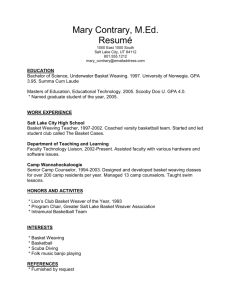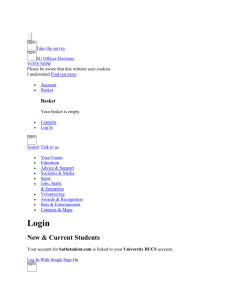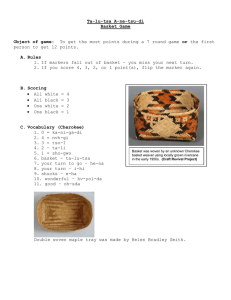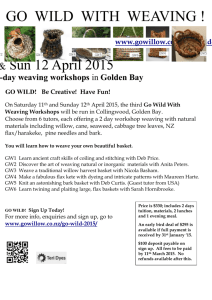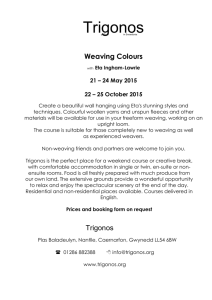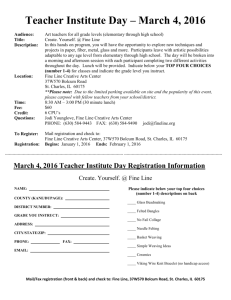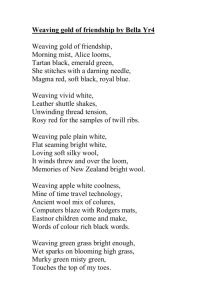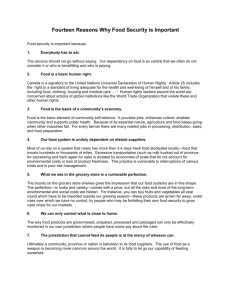American University Academic Program: SAMPLE SCHOOL: Basket Weaving practice plan
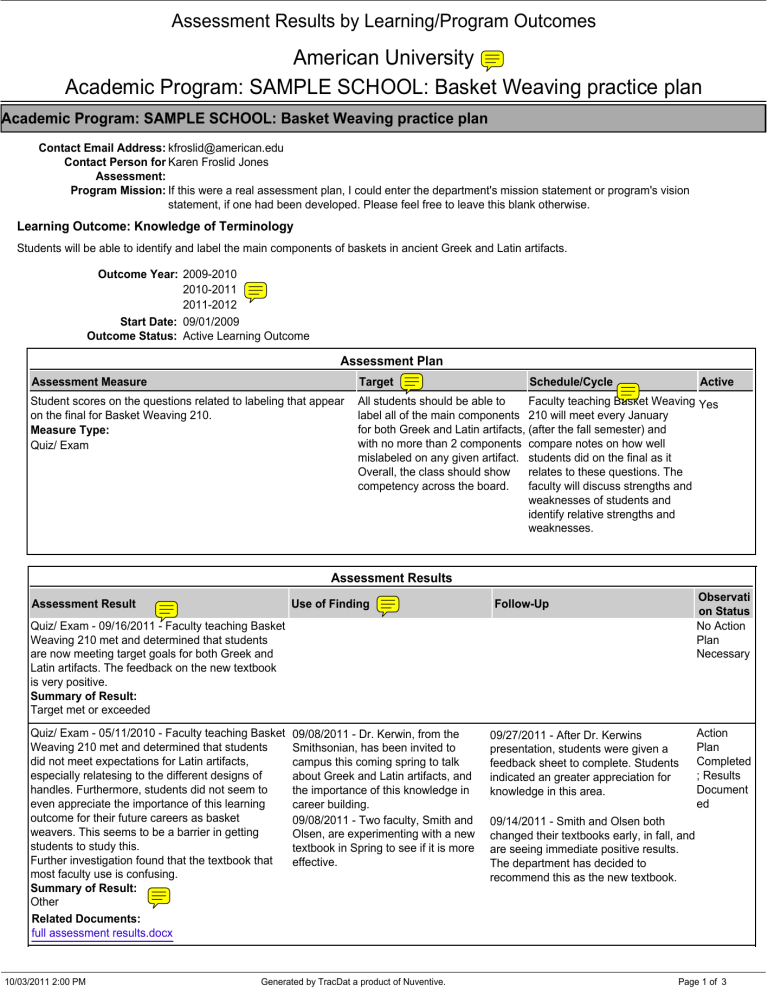
Assessment Results by Learning/Program Outcomes
American University
Academic Program: SAMPLE SCHOOL: Basket Weaving practice plan
Academic Program: SAMPLE SCHOOL: Basket Weaving practice plan
Contact Email Address: kfroslid@american.edu
Contact Person for Karen Froslid Jones
Assessment:
Program Mission: If this were a real assessment plan, I could enter the department's mission statement or program's vision statement, if one had been developed. Please feel free to leave this blank otherwise.
Learning Outcome: Knowledge of Terminology
Students will be able to identify and label the main components of baskets in ancient Greek and Latin artifacts.
Outcome Year: 2009-2010
2010-2011
2011-2012
Start Date: 09/01/2009
Outcome Status: Active Learning Outcome
Assessment Measure
Student scores on the questions related to labeling that appear on the final for Basket Weaving 210.
Measure Type:
Quiz/ Exam
Assessment Plan
Target Schedule/Cycle Active
All students should be able to label all of the main components
Faculty teaching Basket Weaving
210 will meet every January for both Greek and Latin artifacts, (after the fall semester) and with no more than 2 components mislabeled on any given artifact.
Overall, the class should show competency across the board.
compare notes on how well students did on the final as it relates to these questions. The faculty will discuss strengths and weaknesses of students and identify relative strengths and weaknesses.
Yes
Assessment Results
Assessment Result
Quiz/ Exam - 09/16/2011 - Faculty teaching Basket
Weaving 210 met and determined that students are now meeting target goals for both Greek and
Latin artifacts. The feedback on the new textbook is very positive.
Summary of Result:
Target met or exceeded
Use of Finding
Quiz/ Exam - 05/11/2010 - Faculty teaching Basket
Weaving 210 met and determined that students did not meet expectations for Latin artifacts, especially relatesing to the different designs of handles. Furthermore, students did not seem to even appreciate the importance of this learning outcome for their future careers as basket weavers. This seems to be a barrier in getting students to study this.
Further investigation found that the textbook that most faculty use is confusing.
Summary of Result:
Other
Related Documents: full assessment results.docx
09/08/2011 - Dr. Kerwin, from the
Smithsonian, has been invited to campus this coming spring to talk about Greek and Latin artifacts, and the importance of this knowledge in career building.
09/08/2011 - Two faculty, Smith and
Olsen, are experimenting with a new textbook in Spring to see if it is more effective.
Follow-Up
Observati on Status
No Action
Plan
Necessary
09/27/2011 - After Dr. Kerwins presentation, students were given a feedback sheet to complete. Students indicated an greater appreciation for knowledge in this area.
09/14/2011 - Smith and Olsen both changed their textbooks early, in fall, and are seeing immediate positive results.
The department has decided to recommend this as the new textbook.
Action
Plan
Completed
; Results
Document ed
10/03/2011 2:00 PM Generated by TracDat a product of Nuventive.
Page 1 of 3
Learning Outcome: Basket Weaving
Students will demonstrate expertise in the four major basket construction methods including coiling, twining, weaving and plaiting.
Outcome Year: 2007 and prior
2008-2009
2009-2010
2010-2011
2011-2012
Start Date: 09/28/2007
Outcome Status: Active Learning Outcome
Assessment Plan
Assessment Measure Target Schedule/Cycle Active
Review samples of the four kinds of basket construction, using a rubric that rates samples on accuracy of weave patterns, consistency of work, and ability to accurately describe each construction method in writing.
Measure Type:
Creative Work
Related Documents:
BASKET WEAVING RUBRIC.docx
80% of students should be able to score an overall score of "well" or "very well" on at least three patterns. 95% of students should achieve an overall score of at least "fair" on all patterns. Scores for each of the four patterns will also be tracked and targets established.
The department's undergraduate curriculum committee will collect
8 examples of each of the four kinds of basket construction.
Samples of student work from the course BASKET WEAVING 200 will be taken every other spring and be reviewed over the summer. ( This will be done every other year starting in summer
2010.
Yes
Related Courses
- Sample-100 - Intro to Sample
Assessment Result
Creative Work - 08/05/2010 - A review of samples from 19 of the 22 students in the class found that
95% of students scored 'well' or 'very well' on at least three patterns and 95% scored at least 'fair' on all patterns. However, the score for the 'twining' construction was consistently below that of the other methods and was an area of concern for the undergraduate curriculum committee.
Summary of Result:
Progressing as planned
Assessment Results
Use of Finding Follow-Up
09/01/2010 - We plan to suggest to 07/04/2011 - The change in adding more instructors that they have two sessions on 'twining', not just one, and that this 2011 and preliminary results look construction method is assessed positive. Informal feedack from students earlier so that students have more time indicates that they have a better grasp of to take advantage of the departments twining. We'll assess again more grad assistants/tutors should they formally next year.
need more help.
sessions on twining was added in spring
Observati on Status
Action
Plan Being
Implement ed
Learning Outcome: Materials
Students will able to critically evaluate the appropriateness of various weaving materials, and use materials that best meet the purpose of the basket.
Outcome Year: 2009-2010
Start Date: 09/01/2009
End Date: 07/20/2010
Outcome Status: Archived Learning Outcome
Assessment Result
Assessment Results
Use of Finding
No Assessment Results reported.
Follow-Up
Observati on Status
10/03/2011 2:00 PM Generated by TracDat a product of Nuventive.
Page 2 of 3
Learning Outcome: Oral Presentation
Students will be able to give an effective oral presentation designed to explain to the general public the value of hand-woven works of art.
Outcome Year: 2011-2012
Start Date: 08/24/2011
Outcome Status: Active Learning Outcome
Assessment Plan
Assessment Measure Target Schedule/Cycle Active
Oral presentation to faculty, students and staff as part of the At least 90 percent of all oral This data will be collected every
Capstone course. Audience participants will complete a feedback presenters should get an average spring in the Capstone course, form after oral presentations, using a rubric that asks a number of questions, including how well one gained a sense of the value of hand-woven works of art.
Measure Type:
Final Paper/ Final Project score of good or excellent on the question about value of handwoven works of art. The overall score for the presentation should be above the level of good.
with the Capstone faculty member reporting out to the
Undergraduate Curriculum committee the results. Results will be reviewed the following fall.
Yes
Assessment Results
Assessment Result
Final Paper/ Final Project - 09/13/2011 - 95% of students scored good or excellent. However, the faculty were concerned that students consistently didn't look at their audience.
Summary of Result:
Progress toward target is mixed
Use of Finding
09/13/2011 - Students will be taught the importance of looking at their audience.
Follow-Up
Observati on Status
Action
Plan Being
Implement ed
Learning Outcome: History
Students will be able to describe the history of basket weaving, with a special in-depth appreciation for at least one specfic era.
Outcome Year: 2011-2012
Start Date: 09/05/2011
Outcome Status: Active Learning Outcome
Assessment Result
Assessment Results
Use of Finding
No Assessment Results reported.
Follow-Up
Observati on Status
10/03/2011 2:00 PM Generated by TracDat a product of Nuventive.
Page 3 of 3
